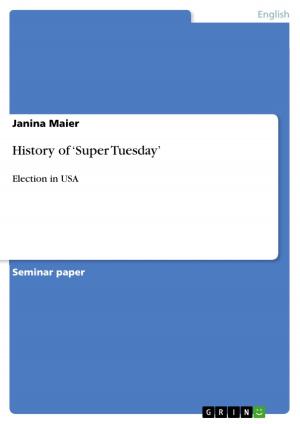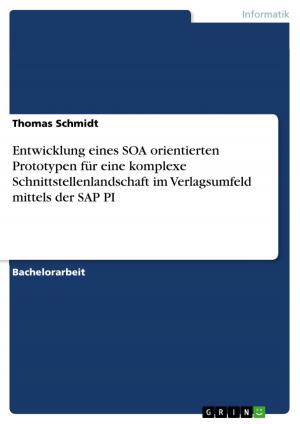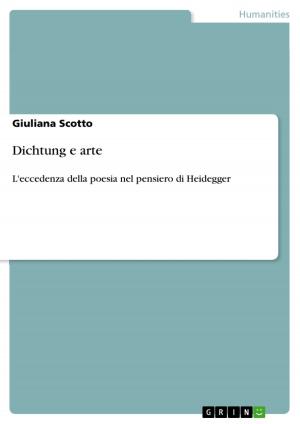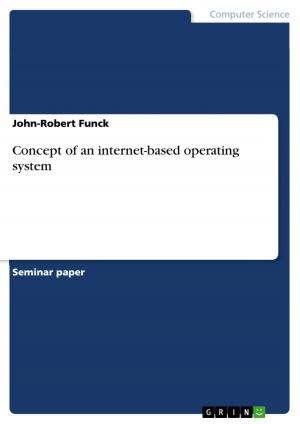The European Union as an Actor in the General Agreement on Trade in Services - Contents, Chances and Risks of Negotiations
Contents, Chances and Risks of Negotiations
Nonfiction, Social & Cultural Studies, Political Science| Author: | Joanna Mastalerek | ISBN: | 9783638349901 |
| Publisher: | GRIN Publishing | Publication: | February 14, 2005 |
| Imprint: | GRIN Publishing | Language: | English |
| Author: | Joanna Mastalerek |
| ISBN: | 9783638349901 |
| Publisher: | GRIN Publishing |
| Publication: | February 14, 2005 |
| Imprint: | GRIN Publishing |
| Language: | English |
Seminar paper from the year 2005 in the subject Politics - International Politics - Topic: European Union, grade: A, Jagiellonian University in Krakow (Europaeistik), course: The Common Market and International Commerce, 32 entries in the bibliography, language: English, abstract: In 1994, the majority of countries which founded the WTO in 1995, concluded a first general agreement on the liberalization of services (GATS). Within the framework of the General Agreement on Trade in Services (GATS) liberalization in international trade of services is supposed to be negotiated progressively 1 . Among 12 service subsectors, education is explicitly featured in GATS. However, before the inclusion of education in the Service Round negotiations as part of the Doha Round in the year 2000, educational services did not draw much attention. One reason being the strong underestimation of their market shares. The EU, as one of the Contracting Parties of the GATS, has already agreed at the Uruguay Round in 1994, to guarantee free access and non-discrimination for foreign competitors in almost the entire education sector, that consists of primary, secondary, tertiary education as well as adult education. Until 2005 the ongoing Doha Round scheduled further liberalization of educational services and thus the EU is likely to be under the pressure to even further liberalize its education sector. Since large parts of the education sector in the EU belong to public service, liberalization of educational services is a subject of heated debate. Neoliberal economists and politicians view the privatization of public services as the best way to increase both efficiency and the benefit for all members of the society. Anti-globalization activists fear the loss of public control over essential public services and regard the society as exposed to the ruthless greed of gain by multinational companies. Moreover the anti-globalization activists complain about the redefinition of educational services as a profitable product. The international trade of educational services thus remains a highly controversial issue, causing the necessity for careful deliberation of the particular contents, chances and risks of the liberalization of educational services. This essay will take up this kind of deliberation, explaining the relevance of educational services in international trade and the significance of education as a public service.
Seminar paper from the year 2005 in the subject Politics - International Politics - Topic: European Union, grade: A, Jagiellonian University in Krakow (Europaeistik), course: The Common Market and International Commerce, 32 entries in the bibliography, language: English, abstract: In 1994, the majority of countries which founded the WTO in 1995, concluded a first general agreement on the liberalization of services (GATS). Within the framework of the General Agreement on Trade in Services (GATS) liberalization in international trade of services is supposed to be negotiated progressively 1 . Among 12 service subsectors, education is explicitly featured in GATS. However, before the inclusion of education in the Service Round negotiations as part of the Doha Round in the year 2000, educational services did not draw much attention. One reason being the strong underestimation of their market shares. The EU, as one of the Contracting Parties of the GATS, has already agreed at the Uruguay Round in 1994, to guarantee free access and non-discrimination for foreign competitors in almost the entire education sector, that consists of primary, secondary, tertiary education as well as adult education. Until 2005 the ongoing Doha Round scheduled further liberalization of educational services and thus the EU is likely to be under the pressure to even further liberalize its education sector. Since large parts of the education sector in the EU belong to public service, liberalization of educational services is a subject of heated debate. Neoliberal economists and politicians view the privatization of public services as the best way to increase both efficiency and the benefit for all members of the society. Anti-globalization activists fear the loss of public control over essential public services and regard the society as exposed to the ruthless greed of gain by multinational companies. Moreover the anti-globalization activists complain about the redefinition of educational services as a profitable product. The international trade of educational services thus remains a highly controversial issue, causing the necessity for careful deliberation of the particular contents, chances and risks of the liberalization of educational services. This essay will take up this kind of deliberation, explaining the relevance of educational services in international trade and the significance of education as a public service.















